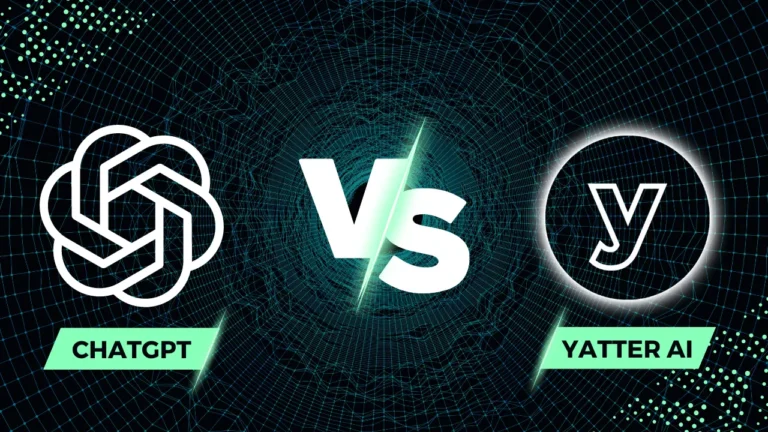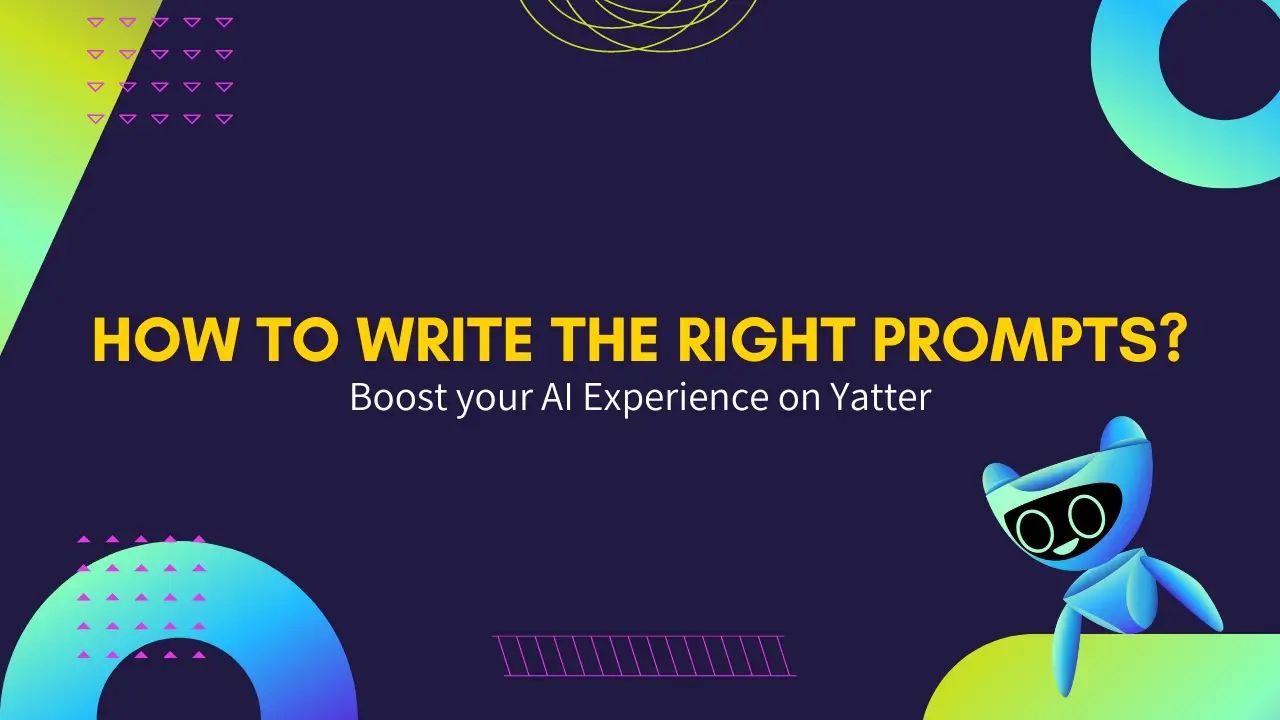

Why Asking the Right Questions with Yatter Matters
When you’re chatting with Yatter, the questions you ask play a crucial role in getting helpful answers. Imagine you ask a question, and the AI gives you an answer that doesn’t make sense. Frustrating, right? That’s why asking the right questions matters a lot.
Let us break it down for you
‣ Clarity Is Key
Imagine you’re talking to a friend. If you ask them a clear question, you’re more likely to get a useful answer. The same goes for Yatter. Clear questions help it understand what you want. So, avoid questions like, “Tell me about avocados” Instead, ask, “What are the nutritional benefits of avocados, and how can they be incorporated into a healthy diet?”
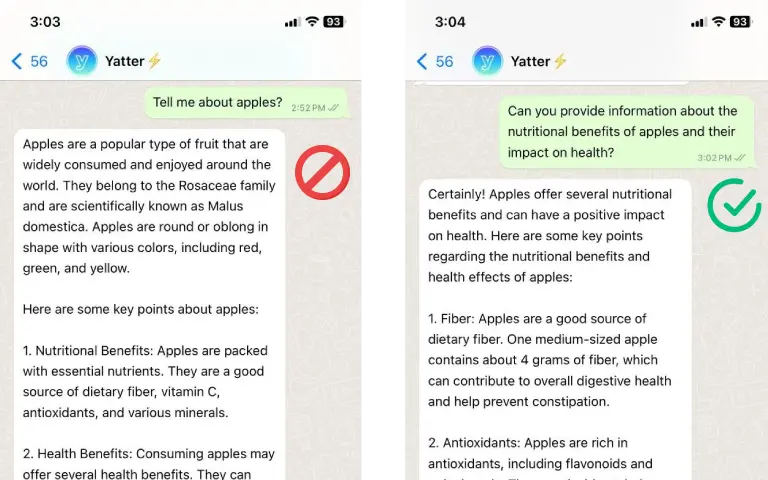
‣ Specific Questions Get Specific Answers
If you want precise information, ask precise questions. Specific questions help AI to give you specific responses. For example, instead of asking, “How’s the weather?” you can ask, “What’s the weather forecast for New York tomorrow?”
‣ Poorly Phrased Questions Lead to Confusion
Imagine if someone asked you a question that didn’t make sense. You’d be confused, right? If your question is unclear or has typing mistakes, then Yatter tries its level best to understand your context and respond accordingly. However, sometimes, grasping the right context may prove challenging due to typing mistakes.
‣ Examples
Bad Question: “Tell me about the universe.”
Good Question: “What are the main theories about the origin of the universe?”
Seen the difference? The good question is clear and specific, making it easier for Yatter to provide a meaningful answer.

Understanding Context and Specificity
When you’re having a conversation with Yatter, think of it as talking to a helpful friend who is always eager to assist. Just like in any conversation, the more context and details you provide, the better the conversation flows.
‣ Why Context Matters
Imagine asking a friend for restaurant recommendations without specifying your preferences. You might end up with a list of random places that may or may not suit your tastes. The same principle applies when interacting with Yatter.
To get the most accurate and relevant responses, it’s crucial to provide context. For instance, if you’re seeking advice on book recommendations, mentioning your favorite genre of books you’ve enjoyed recently can make a world of difference. This extra information helps Yatter to understand your preferences and personalize its response accordingly.
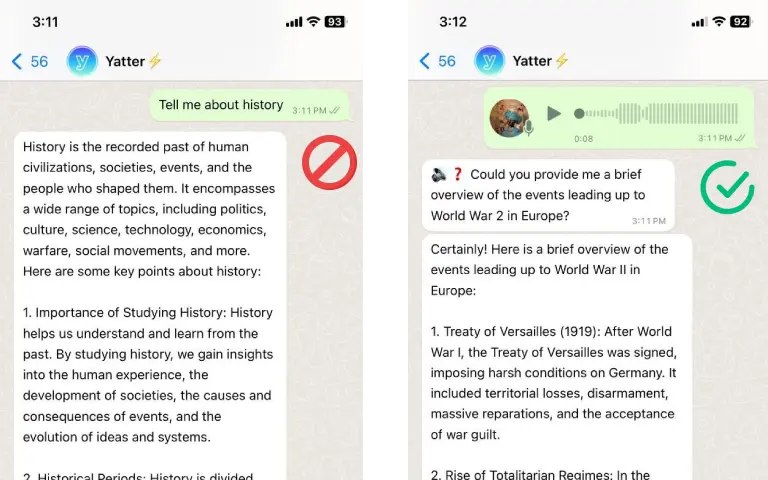
‣ The Power of Specificity
Specificity is the key to unlocking the full potential of Yatter. Instead of asking a broad question like “Tell me about space,” try narrowing it down to something like “Can you explain black holes and their significance in astrophysics?” Specific questions not only lead to more in-depth answers but also show that you’re actively engaged in the conversation.
‣ Example:
Instead of asking: “Tell me about Abraham Lincoln”
You could ask: “What were Abraham Lincoln’s key accomplishments during his presidency?”
This focused question guides Yatter to provide a more precise and informative response.
So, remember, when you’re chatting with Yatter, consider providing context and being specific in your questions. It’s like giving your virtual conversation partner a clearer roadmap to help you on your journey of discovery.

Asking Long Answer Questions or Short Answer question is your choice
In your conversations with Yatter, the type of questions you ask can greatly influence the depth and richness of the answers you receive. Long answer questions are like opening a door to a more engaging and informative dialogue. While short answer questions are for quick and straightforward responses.
‣ What Are Long Answer Questions?
Long answer questions are those that cannot be answered with a simple “yes” or “no.” Instead, they invite a more elaborate response, encouraging a thoughtful and meaningful exchange.
When you ask a long answer question, you’re giving Yatter the opportunity to share knowledge, insights, and ideas in a way that a short answer question might not. This leads to more engaging and informative conversations.
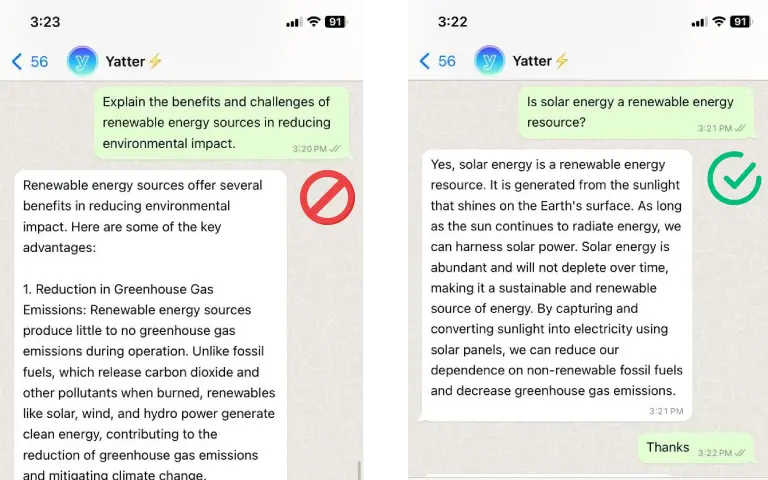
‣ Example:
“Can you explain the concept of climate change and its impact on our planet?”
This question prompts Yatter to provide a comprehensive explanation of climate change.
‣ What Are Short Answer Questions?
Short answer questions are more suitable when you require specific, concise answers or seek quick information. These questions typically start with words like “is,” “are,” “do,” or “does.”
‣ Example:
“Is Mount Everest the tallest mountain in the world?”
This question can be answered with a straightforward “yes” or “no,” providing a quick and factual response.
When interacting with Yatter, you have the flexibility to personalize your questions to suit your specific needs. Whether you’re looking for detailed explanations or quick, concise responses, the choice is yours. If you need your answers in a shorter format, you can even directly request, “Answer my question in short,” and Yatter will respond accordingly.

Specialized Responses for Your Unique Profession
Yatter understands that every individual is unique, with specific needs and interests shaped by their profession. Whether you’re a student, a doctor, a corporate employee, or in any other profession, Yatter is here to provide you with responses that are tailored to your context and requirements.
‣ How It Works
When you engage in a conversation with Yatter, feel free to mention your profession or the context of your question. By providing this information, you’re helping Yatter to better understand your perspective, allowing it to offer responses that are more relevant and useful to you.
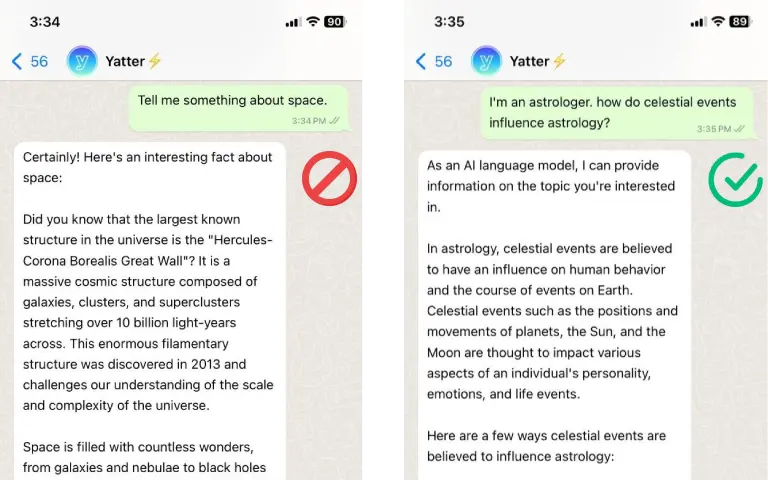
‣ Examples
If you’re a student seeking help with a math problem, you can say,
“I’m a student working on a math assignment.”
A doctor looking for medical insights might mention,
“I’m a medical professional interested in learning more about recent advancements in healthcare.”
A corporate employee inquiring about business strategies can start with,
“I work in the corporate world and want to know about effective marketing strategies.”
By specifying your profession or context, you’re setting the stage for a more personalized interaction. Yatter can then draw from its vast knowledge to provide insights, explanations, or advice that align with your professional background.
‣ Why It Matters
This personalized approach ensures that Yatter doesn’t offer one-size-fits-all responses. Instead, it adapts to your unique needs, making your interactions more efficient and valuable. Whether you’re seeking information, assistance, or insights related to your profession, Yatter is here to assist you on your terms.
So, don’t hesitate to let Yatter know your profession or context when you start a conversation. It’s a simple yet effective way to enhance your experience and get responses that truly cater to your specific needs and interests. Also you can know more about Yatter AI by reading FAQ’s about Yatter AI.






